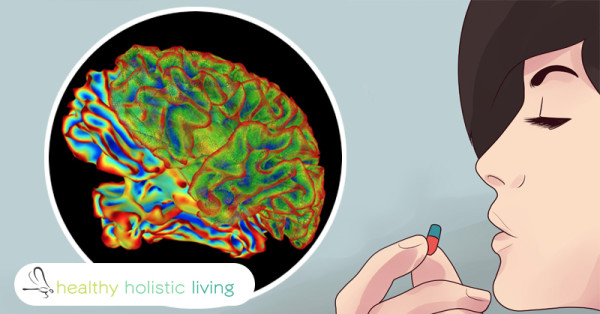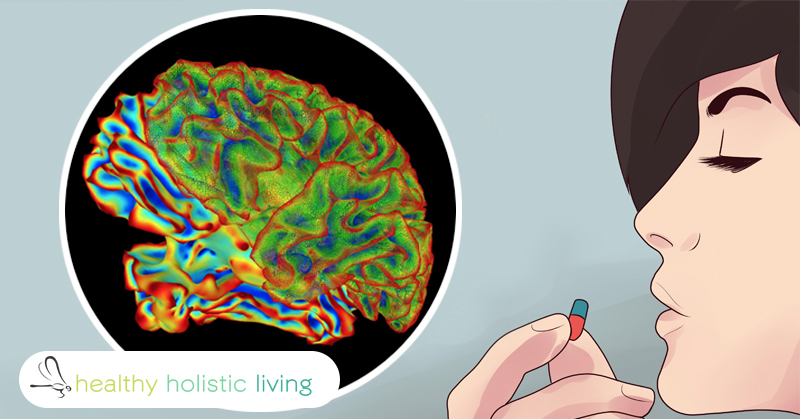
At Healthy Holistic Living we search the web for great health content to share with you. This article is shared with permission from our friends at Be Brain Fit.
By Deane Alban
Memory loss and dementia are some of many side effects of statins. Are statins even effective against heart disease? Learn doctor-recommended alternatives.
cholesterolandalzheimers
If you’ve been diagnosed with high cholesterol, it’s very likely your doctor prescribed a type of cholesterol-lowering drug called statins.
Statin drugs are the most commonly prescribed drugs in the world — and among the most profitable. (1)
One in two senior men and one in three senior women are taking these drugs. (2)
We are currently experiencing an epidemic of dementia with Alzheimer’s now being the sixth leading cause of death in the US. (3)
Is there a connection between taking statins and memory loss, or statins and dementia?
And will taking statins really protect you from heart disease?
Let’s examine the evidence.
Why Your Brain Needs Cholesterol
Your brain is 60% fat with much of that being cholesterol.
Cholesterol is an integral part of every brain cell.
Without adequate cholesterol your brain cells will die.
25% of all of the body’s cholesterol is found in the nervous system.
Cholesterol is needed to make neurotransmitters — chemicals brain cells use to communicate with each other.
But cholesterol-lowering drugs inhibit neurotransmitter production which leads to impaired memory and other cognitive functions. (4)
High total cholesterol actually reduces the risk of dementia in the elderly which is contrary to prevailing medical belief. (5)
Statin Side Effects
Cholesterol-lowering statin drugs like Mevacor, Lipitor, and Crestor are linked to serious memory loss, fuzzy thinking, and learning difficulties. (6)
(There are many other medications that cause memory loss too.)
Statins decrease the production of a heart-protecting nutrient, CoQ10, leading to fatigue and muscle pain. (7)
Some people get very depressed, anxious, or even suicidal when taking these drugs. (8)
People who consume a diet low in fats and especially low in cholesterol are at risk for depression and suicide.
— PsychologyToday.com
The connection between statins and memory loss and other side effects is so strong that these medications are now required to carry a warning label on each bottle.
?OptiMind A single supplement for better thinking, mental energy, productivity, and mood
This warning should state “increased risk of liver damage, memory loss and confusion, type 2 diabetes and muscle weakness.” (9)
Statins can lead to diabetes at an alarming rate.
One study found that 48% of women who take these medications eventually develop diabetes which greatly increases your risk for dementia. (10, 11)
And because cholesterol is a building block of sex hormones, statin use leads to loss of libido. (12)
Is it a coincidence so many men need Viagra these days?
Maybe not.
We’ve Been Asking the Wrong Question
Now that you’ve seen cholesterol medication’s side effects, you might be wondering how to reduce cholesterol naturally without using these harmful drugs.
But this may be the wrong question.
The real question that begs to be answered is …
“Does high cholesterol really cause heart disease?”
You may be surprised to learn the answer to this.
The reason you’ve been told to lower your cholesterol is to prevent heart disease, right?
?Omega-3 Supplements See Amazon.com for best selection and value
We know that heart disease is a killer.
It’s the number one cause of death in industrialized nations. (13)
Conventional “wisdom” tells us to eat a low-fat diet, avoid saturated fat, and keep our cholesterol level low for our hearts.
But consider this …
Of all the people who are hospitalized for a heart attack, only 25% of them have high cholesterol.
The other 75% have normal cholesterol. (14)
It looks like what we’ve been told about cholesterol causing heart disease is wrong.
The Cholesterol-Heart Disease Myth
“Fat and cholesterol cause heart disease” may be one of the biggest health myths of all time!
Eating a low-fat diet doesn’t prevent heart disease or help you live longer. (15, 16)
Turns out there is no correlation between saturated fat consumption and heart disease.
The National Institutes of Health reported that increasing fat intake to 50% of calories improved the nutritional status of study participants, and didn’t negatively affect heart disease risk factors. (17)
High-fat diets actually lower triglycerides, normalize LDL (bad cholesterol), and increase LDL particle size, which is a good thing. We’ll explain shortly. (18, 19)
Considering how embedded in our culture the “fat causes heart disease” theory is, this is a stunning revelation!
This graph illustrates the findings from a World Health Organization study on trends in cardiovascular disease. (20)
averagecholesterol
It very clearly shows that there is no correlation between cholesterol and heart disease.
Notice that the country with the highest levels of cholesterol — Switzerland — has one of the lowest rates of heart disease.
The AHA’s “Prudent” Diet Is a Killer
The landmark Lyon Diet Heart Study followed 650 participants who were at extreme risk for heart attacks. (21)
They were overweight, sedentary, smoked, and had high cholesterol levels — the works.
Half were put on a Mediterranean diet and half were put on what was called a “prudent” Western-type diet recommended by the American Heart Association.
The study was halted before it was completed because it was deemed unethical.
Why?
People on the Mediterranean diet stopped dying even though their cholesterol levels didn’t budge.
However so many people on the American Heart Association’s diet were dying, researchers felt it was unethical to continue putting people at risk!
The Low-Fat Fail
The experts are finally coming around to the fact that low-fat diets haven’t worked at either preventing heart disease or obesity.
Harvard School of Public Health issued this statement about the “low-fat fail”:
“Well it’s time to end the low-fat myth. The low-fat approach to eating hasn’t helped us control weight or become healthier. Why hasn’t cutting fat from the diet paid off as expected? Detailed research — much of it done at Harvard — shows that the total amount of fat in the diet isn’t really linked with weight or disease.”
— Harvard School of Public Health
The graph below illustrates how the introduction of low-fat guidelines by the US government in the 1970’s has correlated with increasing obesity.
cholesterolrising
Treat the Patient, Not the Numbers
Unfortunately, most doctors tend to worry more about lowering cholesterol numbers than the overall health of their patient.
Testing for HDL (good) cholesterol or LDL (bad) cholesterol levels is an outmoded idea.
There are more than five kinds of each, so this philosophy is overly simplistic.
?Omega-3 Supplements See Amazon.com for best selection and value
One test that seems to provide good information about your risk for heart disease is to measure LDL particle size.
Large LDL molecules just move through the blood stream, doing no harm.
But small LDL molecules are caused by oxidation and are dangerous.
They embed themselves on artery walls, causing inflammation, and leading to plaque development.
alzheimerslinktocholesterol
If your HDL and LDL numbers are not good predictors of heart disease, what is?
Two important markers are your small particle LDL and your ratio of triglycerides to HDL.
For example, if your triglyceride level is 100 and your HDL is 50, this gives you a ratio of 2. A ratio of 2 or under is good.
If this ratio is higher than that, you can lower your triglycerides fairly easily by reducing sugar and refined carbohydrates while eating more healthy fats. (22)
The Real Cause of Heart Disease
You may be wondering: If high cholesterol is not the underlying cause of heart disease, what is?
Dr. Jonny Bowden and Dr. Stephen Sinatra, authors of The Great Cholesterol Myth, discovered the five worst culprits proven to contribute to heart disease to be:
Inflammation promotes every degenerative disease. It causes microinjuries to your arteries, causing plaque formation.
Free radicals attack LDL turning it from large (safe) to small (harmful) particle LDL.
Sugar is highly inflammatory, promoting plaque formation. It also increases stress hormones.
Trans fats increase bad cholesterol, decrease good cholesterol, increase inflammation, and raise triglycerides.
Stress increases blood pressure. In fact, blood pressure is a measure of stress applied to artery walls.
?Extra Virgin Olive Oil See Amazon.com for best selection and value
Drs. Bowden and Sinatra offer these simple lifestyle recommendations to prevent heart disease:
Reduce sugar, grains, and vegetable oils high in omega-6 fats like canola oil.
Eat heart-healthy fats like nuts, olive oil, coconut oil, and avocado.
Manage stress.
Exercise.
Drink moderately.
Don’t smoke.
Supplement intelligently.
Their top recommended supplement for heart disease is the same as ours for brain health —omega-3 essential fatty acids.
?Omega-3 Supplements See Amazon.com for best selection and value
Why Doctors Push Statin Drugs
All of this new information may leave you wondering why doctors prescribe statin drugs at all.
moneypillsThe answer isn’t pretty.
One study found that 65% of doctors don’t report statin side effects because either they don’t believe there’s a correlation or they have been “influenced” by the drug companies. (23)
In this study, doctors admitted to sloughing off their patients’ concerns about statin side effects with pat answers like “it’s your age” or “learn to live with it.”
?OptiMind A single supplement for better thinking, mental energy, productivity, and mood
Pharmaceutical companies have a vested interest in continuing to promote this $31 billion industry.
Right now, one in four adults takes statins.
Recently, the American Heart Association released new guidelines that, if followed, could double the number of people taking cholesterol-lowering medications. (24)
You do the math.
On Statins? How to Talk to Your Doctor
If you currently take statins and are experiencing side effects like memory loss, brain fog, or muscle pain, make an appointment to talk to your doctor today.
Go in armed with as much information on cholesterol as possible, like the kind you find in The Great Cholesterol Myth: Why Lowering Your Cholesterol Won’t Prevent Heart Disease — and the Statin-Free Plan That Will.
Ask to have the small particle LDL test done.
Most doctors won’t run this test as a matter of course. Some doctors won’t even know what it is.
Most will still spout the party line about cholesterol.
Even doctors who understand the value of this test don’t recommend it because it’s normally not covered by insurance.
You can ask for it anyway and offer to pay out of pocket.
You can also order this test on your own at an online lab like True Health Labs.
Statins and Memory Loss: The Bottom Line
Low-fat diets and cholesterol-lowering drugs are not the key to ending heart disease as we’ve been led to believe.
But they are undoubtedly a common cause of memory loss and may contribute to dementia.
If you suspect statins are the cause of your memory loss, talk to your doctor.
If your doctor is not open-minded about helping you get off of cholesterol medication, find one that is.
Don’t let your brain be a victim of an unnecessary medication.
SOURCE:











Sign up on lukeunfiltered.com or to check out our store on thebestpoliticalshirts.com.